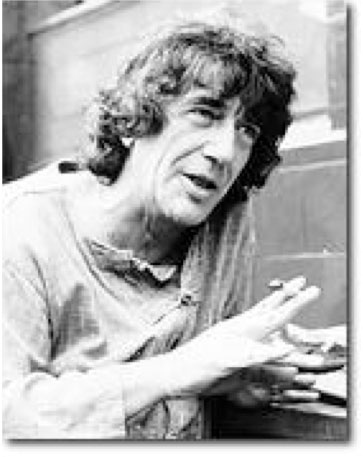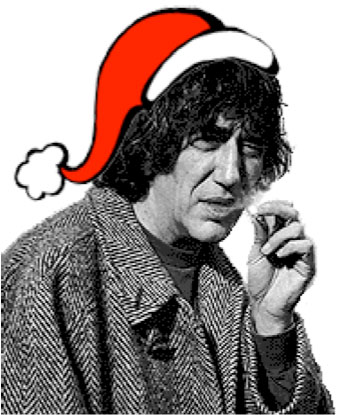Howard Marks Interview
Adrenaline is a chemical with wildly different effects. The sudden rush of a chance encounter with someone as celebrated as Howard Marks would make some people clam up and turn pink. Not so your UsersVO I C Ecorrespondent.
Faced with ‘Mr Nice’ himself at the ICA’s recent ‘Ultimate Drugs Weekend’, I found it even more difficult than usual to stop talking! True, some of the ‘medicines’ I had consumed as I ran from Lavazza to the underground might have contributed to this loquaciousness, but I think it was mostly a product of the sheer intrigue and joy of spending half an hour in St. James’s Park chatting with a fellow drug policy reformer and exposer of drug-related corruption in the status quo. Hope you agree…
UV: Sorry if some of these questions sound inane to you, Howard, but to an addict, they are important. Were you ever afraid as a young pot smoker that you would become an addict?
HM: No, never.
UV: Never?! How come?
HM: I could see what was happening to people using heroin and cocaine, and it scared me. I didn’t want that, so I stayed away from it.
UV: Amazing! Always fascinates me meeting a so-called ‘normal’ person! I mean someone who can use a substance and not get in a mess with it.
HM: Less of the normal, please! Sounds like it could be an insult! But Andria, there are many reasons why people get in a mess with drugs and they are not all internal, or to do with their psychological make-up.
UV: What d’you mean?
HM: Take the very sad case of Leah Bett’s death. As far as I can see it was prohibition that killed her because she didn’t have all the information she needed about the substance and how to do it safely. The poor child flooded her system out by drinking too much water. If she had been in a situation where keeping her drug use didn’t have to be a secret, she probably would have lived that night. It’s reported that over a million people in the UK do ‘E’ each weekend, and the number of deaths each year is around 11. Incidentally there are between 500 and 600 deaths due to paracetamol poisoning annually. We really need to get the risk factors around illegal drugs into perspective. Ecstasy-related deaths are a minute percentage of the actual numbers using the substance.
UV: But to the parents of the dead ecstasy users…
HM: Of course, and as a parent myself I can only imagine how painful it must be to lose a child for any reason. But the way the press used Leah’s parents after her death was dangerous. All drug education should come as a package which tells the whole truth. Drugs have a function whether they be legal or not. And telling young people that drugs are bad they shouldn’t use them is pointless. They listen to each other far more; all it takes is for one to take an ‘E’ and have a great time. Then they know we’ve lied to them. What’s to say we won’t do the same about heroin or anything else for that matter?
UV: Do you have children?
HM: I have four children aged 27, 22, 19, and 13, and one grandson aged one – I’m old! [Howard goes all coy at this point – it was endearing to behold.]
UV: How have you – do you – address the drugs issue as a parent?
HM: I just talk very openly to them about drugs. Like any parent I want my kids to be as healthy aspossible, and it’s my responsibility to tell them what they need to know for their happiness and for their safety.
UV: Do you think it’s possible to be too liberal about how you speak with kids about drugs?
HM: No.
UV: Do you think there is a basis for people living in pain from AIDS (or whatever) who campaign for the use of medical marijuana, to get together with other pot campaigners?
HM: I think you’re talking about the therapeutic use of cannabis. While I think it is appalling that sufferers are not allowed to alleviate their symptoms by availing themselves of a natural herb, my campaigning focuses, almost exclusively, on allowing people to take drugs for recreational use without the threat of punishment. I may be pessimistic, but I doubt if suffering addicts with AIDS etc, could look for too much help from pot smokers.
UV: How would you feel as a father if heroin were sold in a supermarket? Aconcept of free marketeers and libertarians as far as I can see.
HM: Better than if it was sold by a bunch of dickheads at a street corner, but not as good as if it were sold through properly informed druggists.
UV: Forgive my ignorance but what’s a druggist?
HM: A person who works at your neighbourhood drug store and, before the US 1914 Harrison Act, could sell laudanum (opium tincture) amongst other things over the counter.
UV: Sounds like an idea Dr. John Marks talked about.
HM: Yeh, it was him that I got the idea from! The thing is they are responsible for selling you a clean drug, and you know the quantity you are buying, which is not the case at the moment, and has led to many of the OD cases we read about. The whole addiction debate, I think, needs to be opened up much more. In short, I’m for treatment and against criminalisation but I also think we need to discuss it more openly in society so it’s not just the remit of a chosen few doctors etc.
UV: Do you think they should legalise all drugs all at once, or in developmental stages, starting with the least physically and economically harmful and then moving on?
HM: Since we are nowhere near that stage at this point in time, I really don’t think that matters right now. I’m not here to promote drugs – I simply care that those who choose to do so are kept safe and out of harm’s way. Under prohibition that’s impossible. If you don’t get arrested, you can get ripped off, or beaten by gangsters over a drug transaction. The whole thing is riddled with risk. I really think it’s important that we look at how the US developed its very rigid prohibitionist position on drugs, as it affects other governments potentially the world over. Most, if not all, of their policies were racially based: they targeted Chinese migrants at the turn of the century who used opium, they did the same with Latin Americans who used cocaine, and of course the same nonsense with the African American musicians in the blues music scene. The music was of the devil and therefore the drugs were too, because they were black not because they wanted to protect black people from killing themselves with dope. They just wanted to be able to point the finger somewhere and – hey surprise! – ethnic minorities got targeted. It’s so important that people learn the history of the development of prohibition if they want to challenge it sensibly.
UV: Do you not think there was any good intentions behind the illegalisation of some chemicals then?
HM: Intentions are different from results, Andria. What we are witnessing is the incarceration of otherwise completely innocent people, you know the score, I don’t have to tell you I’m sure. The thing is, expecting most prohibitionists to be rational, as far as far as I can see, will only lead to disappointment. Their policies are fear-led and we have to be rational to implement effective drug policy. Time and time again, we hear from them: “Until the research shows that Pot [for example] is not harmful, we will not legalise.” But the evidence for heroin, cannabis and other substances on prescription has been positive and there for ages. The real issues are to do with their lack of political will and cowardice. It’s a very recent that drug policy reform has even become slightly popular as a notion. It is way past time that governments got honest about their actual agendas as opposed to the ones they want us, the public, to think they care about.
UV: Howard, thanx for talking to us at the Users’ Voice.
HM: Thank you, and take care.

